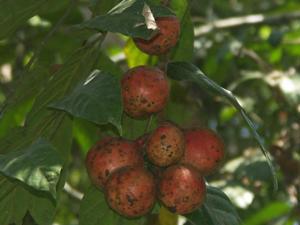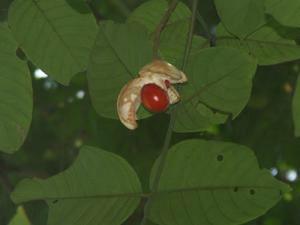Pia Sethi
In this study, I propose to test whether hunting of hornbills differentially impacts the dispersal and regeneration of large and small-seeded tree species in the Eastern Himalayas

Chisocheton seeds.
Hunting is widespread throughout the tropics with potentially severe consequences for forest dynamics particularly seed dispersal and forest regeneration. Seed dispersal confers a critical survival benefit to several plant species by moving seeds away from density dependent mortality factors in the vicinity of adult conspecifics and to microsites favourable for establishment and is often key to forest regeneration and recruitment. Because hunters preferentially exterminate large-bodied seed dispersers such as hornbills, I hypothesize that hunting pressures will likely disproportionately impact the dispersal ecology of large-seeded tree species as compared with small-seeded ones since only large frugivores have the ability to ingest and transport large seeds. In contrast, small seeds can potentially be transported by a generalized suite of, small-bodied frugivores thereby reducing the possibility that they may be dispersal limited due to the loss of their dispersers.

5Chisocheton capsule with last remaining seed.
Elimination of hornbills which are important dispersers for trees in Asia and Africa may lead to drastic changes in the composition and diversity of forests with a decline of large seeded, primary forest species and a preponderance of pioneer or early to mid-successional trees characterized by many, small seeds. Despite the potentially profound implications of loss of large dispersers for tropical forests, there have been few attempts to determine whether some tree guilds may be more susceptible to disperser loss than others. In this study, I propose to test whether hunting of hornbills differentially impacts the dispersal and regeneration of large and small-seeded tree species in the Eastern Himalayas, a globally important biodiversity hotspot and India's last frontier of wilderness.
This study is imperative because conservation strategies need to focus on preventing loss of tree species and their agents of seed dispersal in the exceedingly diverse evergreen forests of the Eastern Himalayas. If this study shows that hornbill hunting may reduce the diversity of large seeded tree species it will have widespread management implications for areas as diverse as Neotropical and Paleotropical forests where hunting and poaching are decimating key animal dispersers.